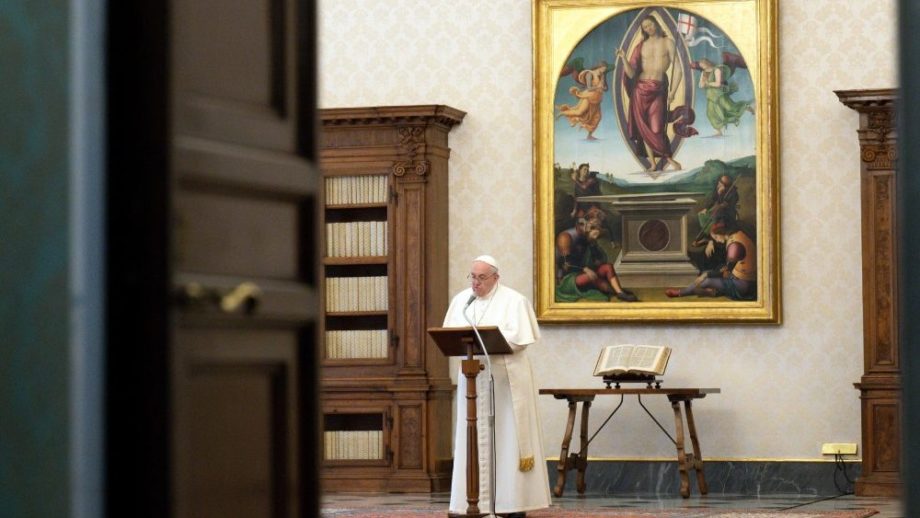During the Easter season, which begins with Easter Sunday and ends on Pentecost Sunday, the recitation of the Angelus is replaced by the prayer of the Regina Coeli.
Pope Francis has prayed the Regina Coeli the so-called Angel Mondayor Easter Monday, from the Library of the Apostolic Palace.
"Dear brothers and sisters, good morning!
The Monday after Easter is also called Angel Mondaybecause we remember the encounter of the angel with the women who went to the tomb of Jesus (cf. Mt 28,1-15). To them, the angel says: "I know that you are looking for Jesus, the Crucified One. He is not here, for he is risen" (vv. 5-6).
The expression "he is risen" goes beyond human capabilities. Even the women who had gone to the tomb and found it open and empty could not say: "He is risen", but only that the tomb was empty. That Jesus had risen could only be said by an angel, just as an angel could have said to Mary: "You will conceive a son [...] and he will be called the Son of the Most High" (Lc 1,31).
The evangelist Matthew narrates that on that Easter dawn "there was a great earthquake: the Angel of the Lord came down from heaven, rolled back the stone from the tomb and sat on it" (cf. v. 2). That great stone, which should have been the seal of victory over evil and death, was placed under the feet, became the footstool of the angel of the Lord. All the plans and defenses of the enemies and persecutors of Jesus have been in vain.
The image of the angel seated on the stone of the tomb is the concrete, visual manifestation of the victory of God over evil, of the victory of Christ over the prince of this world, of light over darkness. The tomb of Jesus was not opened by a physical phenomenon, but by the intervention of the Lord. The angel's appearance, Matthew adds, "was like lightning, and his clothes were white as snow" (v. 3). These details are symbols that affirm the intervention of God himself, the bearer of a new era, of the end times of history.
Before this intervention of God, there is a double reaction. That of the guards, who are unable to cope with the overwhelming power of God and are shaken by an inner earthquake: they are as good as dead (cf. v. 4). The power of the Resurrection strikes down those who had been used to guarantee the apparent victory of death. The reaction of the women is very different, because they are expressly invited by the angel of the Lord not to fear: "Do not be afraid" (v. 5) and not to look for Jesus in the tomb.
From the words of the angel we can glean a valuable teaching: let us never tire of seeking the risen Christ, who gives life in abundance to those who encounter him. To encounter Christ means to discover peace of heart. The same women in the Gospel, after their initial confusion, experience great joy at finding the Master alive again (cf. vv. 8-9). In this Easter season, I wish everyone the same spiritual experience, welcoming into their hearts, homes and families the joyful proclamation of Easter: "The Risen Christ dies no more, for death has no more power over him" (Communion Antiphon).
This certainty induces us to pray, today and throughout the Easter period: "Regina Caeli, laetare - Queen of Heaven, rejoice". The angel Gabriel greeted her thus the first time: "Rejoice, full of grace!" (Lc 1,28). Now Mary's joy is complete: Jesus lives, Love has conquered. May this also be our joy!"









